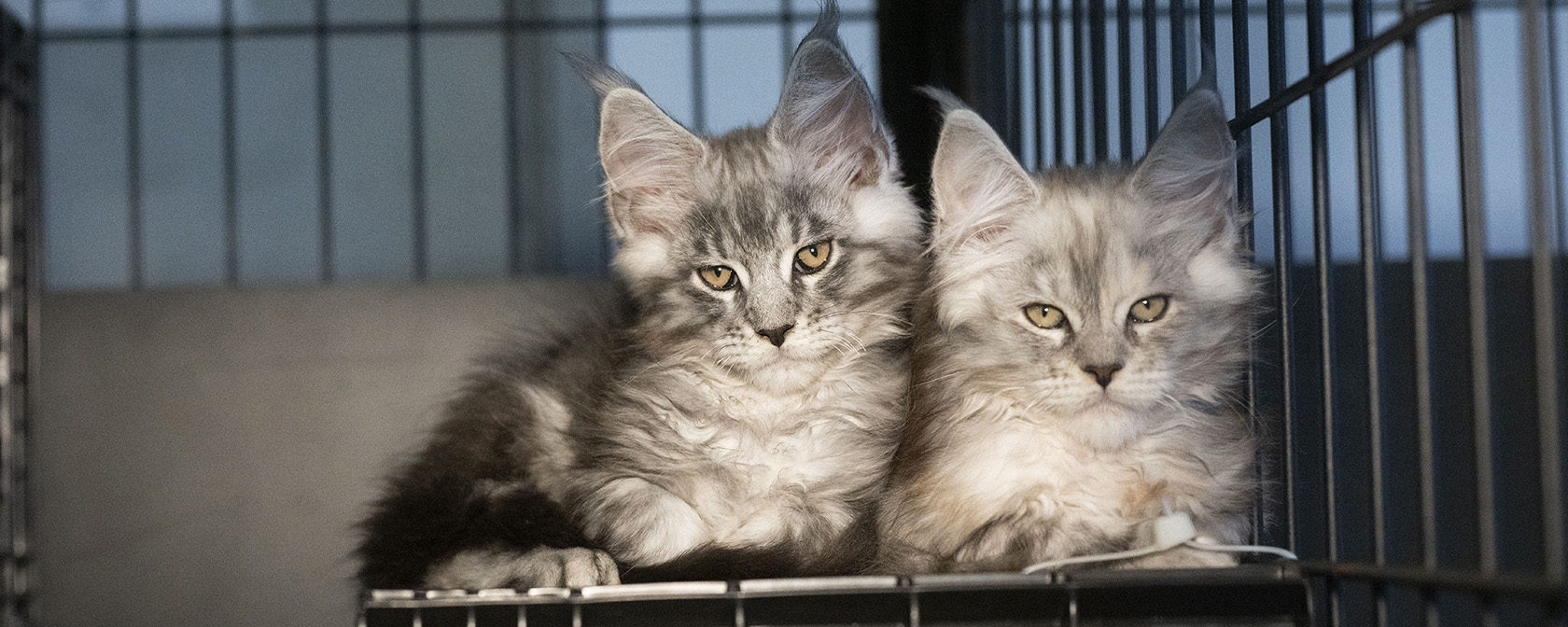By Sara Amundson and Kitty Block
Last fall, our Animal Rescue Team worked with authorities in Virginia to help remove 110 cats from a U.S. Department of Agriculture-licensed dog and cat dealer as part of an alleged cruelty situation. Since March 2023 alone, the USDA had documented more than 50 Animal Welfare Act violations at the facility, including serious ones such as failure to provide proper veterinary care, the housing of incompatible cats together and keeping animals in small enclosures that did not meet the minimum requirements set by the Animal Welfare Act. The breeder had been in our 2023 Horrible Hundred report (an annual list of problem breeders in the U.S.) for inadequate veterinary care and visibly ailing animals. The Virginia Attorney General’s office served a warrant, and we assisted in helping them seize the animals remaining at the breeder.
Since the day of that rescue, our team worked on facilitating the safe transfer of the cats by connecting them to veterinary care and placing them with our shelter and rescue partners, where they could find adoptive homes.
Meanwhile, the feds were working on preventing the cruelty from continuing: The USDA referred the case to the U.S. Department of Justice which was already in the process of taking further action. We are pleased to report that, for the animals who suffered, justice was delivered: In December 2023, the DOJ and the USDA reached an agreement with the breeders and permanently revoked their license. The court also applied more than $300,000 in civil penalties, which was held in abeyance.
This positive outcome is just one that comes after the USDA found itself under intense pressure when two of the agency’s top animal welfare officials had been subpoenaed by a federal grand jury. The grand jury was investigating why these officials appeared to take no action against Envigo, even after dozens of documented Animal Welfare Act violations at its Virginia facility, including the deaths of many dogs. You’ll remember Envigo as the company that breeds animals, like beagles, for use in research; in 2022, a rescue team from the Humane Society of the United States helped to remove nearly 4,000 beagles at the request of the DOJ and in cooperation with the USDA. Not long after being subpoenaed, the two animal welfare officials retired.
Under increasing scrutiny, in 2023, the USDA’s Animal and Plant Health Inspection Service filed animal welfare administrative complaints against noncompliant animal businesses at more than quadruple the rate than under the previous administration. It also cooperated on more cases with the DOJ. APHIS participated in confiscating hundreds of animals from AWA violators in 2023, permanently revoked nine licenses, and pressured several other problem licensees to voluntarily relinquish their animals or their licenses.
In August 2023, APHIS updated new Animal Welfare Act regulations for captive birds, which will be fully in effect this week. The agency also announced in July that it has taken a positive step by seeking out an independent contractor to conduct a review of the entire animal care program, which is expected to be a two-year process with an opportunity for external groups to weigh in. We look forward to providing the agency with any information that can help inform that process.
All these steps are signs of progress. But the USDA’s puppy mill enforcement still falls behind compared to some prior years. For example, only two of the licenses that the USDA revoked in 2023 were dog or cat breeders. Under some prior administrations, the USDA revoked eight or nine puppy mill licenses a year. Some of the most problematic puppy mills in the country, including the notorious Stonehenge Kennel in Iowa, where more than 140 dogs have been found ill or injured, and where almost 200 dogs were euthanized in 2021, remain in business this year, even after appearing in six of our prior Horrible Hundred reports for egregious violations.
The USDA also needs to address the issue of licensed breeders who fail to appear for inspections, leaving potentially hundreds of animals unmonitored for basic health and safety. We’ve also seen some licensees with histories of violations wipe their slate clean by getting a new license number under a different family member’s name at the same address.
The USDA has promised more progress in 2024 and beyond, and we will be watching. You can help by urging your legislator to support the Better Collaboration, Accountability, and Regulatory Enforcement (CARE) for Animals Act, which will strengthen Animal Welfare Act enforcement by giving the DOJ more tools to take proactive action on animal welfare cases, as it did with Envigo and the Virginia breeder case.
Tell your legislator you support action that would allow federal agencies to collaborate more effectively to enforce the Animal Welfare Act. Greater cooperation will help us create a more humane world for animals.
Kitty Block is CEO of the Humane Society of the United States.




